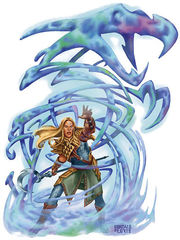As Bitbrain mentioned, Eberron is a good resource to see ways in which necromancers can be tolerated within a society. I don't think anyone actually accepts them, but they can still be seen as a necessary evil or means to an end. Karrnath likely would have fallen in the Last War were it not for the undead created to bolster their depleted defenses. The citizens of Karrnath know this and so they accept it to a degree. They don't really want to see the undead and avoid interacting with intelligent undead. Even during the Last War undead battalions were separated from living battalions, only mixing together in battles when it was absolutely necessary. Outside Karrnath, there may be individuals that see the value a necromancer can bring through their undead creations, others that don't like them but respect them, others that are afraid or traumatized by their direct encounters with undead during the war, others that aspire to the power a necromancer can bring, and still others who are content knowing that should they fall in battle protecting the country they love, their body might be able to continue to fight on even after death.
Also in Eberron you have the elven continent of Aerenal, where the undead are not only integrated into society, but are held in a place of esteem and treated as a class of nobility. In their society, necromancers serve as the curators and custodians through which the ancestors may continue to live on, providing the means for the elders to continue to provide guidance and wisdom for far longer than their natural bodies would allow.
Within Eberron, there are many opinions about necromancers. But ultimately necromancy is a tool. A means to an end. Some see it as distasteful. Others as evil or abhorrent (such as Thrane and the followers of the Silver Flame). Others see it strictly for its utility. And still others see the act of necromancy as a sacred rite that is to be respected and protected as any other religious practice.
The difference between Eberron and other settings is that Eberron takes the time to establish a complex view of necromancer and morality in general. There are few things that are considered absolute good or evil. Thus it is up to society, culture, and taboo to determine how people may interact and perceive this practice. But Eberron is also different because the gods do not directly interact with the world. They are not concrete beings that can make statements about what absolutes may exist in the world.
So ultimately it depends on how your game world views morality in general and necromancy in particular. Are there absolute things that are clearly good or evil? Is the practice of necromancy one of them? If not, what are the cultural and societal taboos and mores that shaped your character, and how might they differ from those where the character ia traveling and adventuring?
Here's a couple articles by Keith Baker on Undead in Eberron in case it helps:
Chronicles of Eberron - Join Eberron setting creator Keith Baker for another journey across the realms of Eberron, from the trackless void of t

keith-baker.com
May is a busy month. I’m swamped with writing and travel (I’m currently at Keycon 35 in Winnipeg), so I haven’t had time to write a proper article. However, I reached out to my Pa…

keith-baker.com
With all the things I should be working on, I shouldn’t be doing another Dragonmark so soon. But this topic came up in online discussion and it’s one of those things I can’t resis…

keith-baker.com






